2019年公共英语三级考试经典语法讲解(10)
公共英语PETS三级语法与词汇例题解析
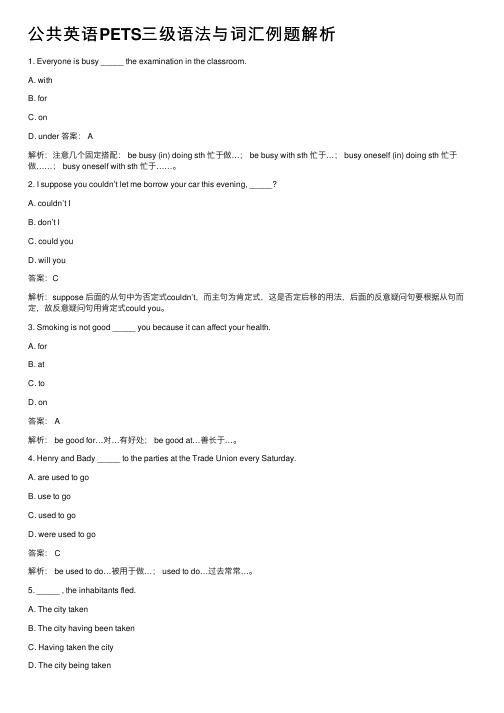
公共英语PETS三级语法与词汇例题解析1. Everyone is busy _____ the examination in the classroom.A. withB. forC. onD. under 答案: A解析:注意⼏个固定搭配: be busy (in) doing sth 忙于做…; be busy with sth 忙于…; busy oneself (in) doing sth 忙于做……; busy oneself with sth 忙于……。
2. I suppose you couldn’t let me borrow your car this evening, _____?A. couldn’t IB. don’t IC. could youD. will you答案:C解析:suppose 后⾯的从句中为否定式couldn’t,⽽主句为肯定式,这是否定后移的⽤法,后⾯的反意疑问句要根据从句⽽定,故反意疑问句⽤肯定式could you。
3. Smoking is not good _____ you because it can affect your health.A. forB. atC. toD. on答案: A解析: be good for…对…有好处; be good at…善长于…。
4. Henry and Bady _____ to the parties at the Trade Union every Saturday.A. are used to goB. use to goC. used to goD. were used to go答案: C解析: be used to do…被⽤于做…; used to do…过去常常…。
5. _____ , the inhabitants fled.A. The city takenB. The city having been takenC. Having taken the cityD. The city being taken答案: B解析:独⽴主格结构。
公共英语三级语法知识汇总

公共英语三级语法知识大全一、句法分析 (1)二、词法分析 (2)三、时态 (8)四、被动语态 (11)五、情态动词 (12)六、不定式 (14)七、定语从句 (17)八、主语从句 (22)九、表语从句 (23)十、宾语从句 (23)十一、同位语从句 (24)十二、状语从句 (25)十三、虚拟语气 (41)十四、动名词 (27)十五、现在分词 (28)十六、过去分词 (31)十七、独立主格结构 (34)十八、倒装句型 (35)十九、强调句型 (36)二十、主谓一致 (37)二十一、It的用法 (39)一、句法分析1、主语:是句子要说明的人或物,可以作主语的成分有名词,主语一般在句首。
注意名词单数形式常和冠词不分家!. 1) Mr. Lee is a well-known scientist.名词作主语. 2) He reads newspapers everyday.代词作主语. 3) Two and ten is twelve.数词作主语. 4) Smoking is harmful to the health.动名词作主语. 5) To swim in that pool is a great pleasure.动词不定式作主语. 6) What we shall do next is not yet decided.从句作主语2、谓语: 说明主语的动作,状态或特征. 1) The new term begins on the 1st of September.. 2) His father is an engineer.3) She seemed happy.. 4) Li Hua showed me his album.3、宾语:指的是及物动词涉及到的人或物. 1) Wang Ling lent me a novel to read in the bus.. 2) The medicine is good for a cold.. 3) How many pieces do you want?. 4) My little sister always likes to ask questions.. 5) Would you mind coming earlier tomorrow?. 6) He asked me what I was going to do tonight4、宾语补足语:在宾语后面补充说明宾语的动作、状态、特征。
2019年全国英语等级考试pets-3三级经典语法辅导(6)
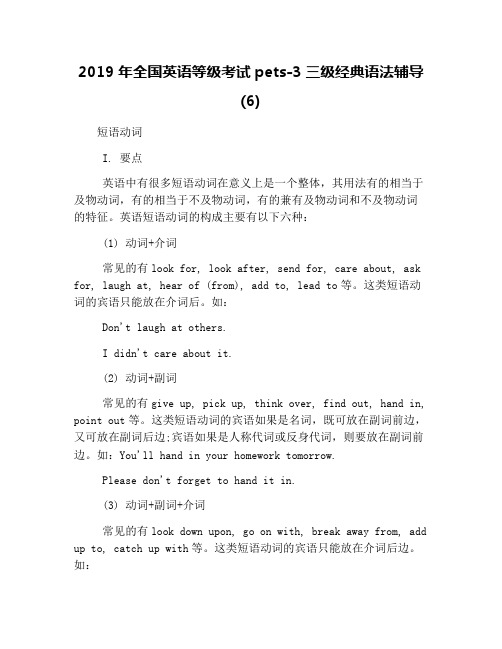
2019年全国英语等级考试pets-3三级经典语法辅导(6)短语动词I. 要点英语中有很多短语动词在意义上是一个整体,其用法有的相当于及物动词,有的相当于不及物动词,有的兼有及物动词和不及物动词的特征。
英语短语动词的构成主要有以下六种:(1) 动词+介词常见的有look for, look after, send for, care about, ask for, laugh at, hear of (from), add to, lead to等。
这类短语动词的宾语只能放在介词后。
如:Don't laugh at others.I didn't care about it.(2) 动词+副词常见的有give up, pick up, think over, find out, hand in, point out等。
这类短语动词的宾语如果是名词,既可放在副词前边,又可放在副词后边;宾语如果是人称代词或反身代词,则要放在副词前边。
如:You'll hand in your homework tomorrow.Please don't forget to hand it in.(3) 动词+副词+介词常见的有look down upon, go on with, break away from, add up to, catch up with等。
这类短语动词的宾语只能放在介词后边。
如:All his money added up to no more than $100.After a short rest, he went on with his research work.(4) 动词+名词+介词常见的有take care of, make use of, pay attention to, make fun of 等。
这类短语动词的宾语只能放在介词后边。
如:You should pay attention to your handwriting.We should make full use of our time.(5) 动词+形容词常见的有leave open, set free, cut open等。
大学英语三级语法详解
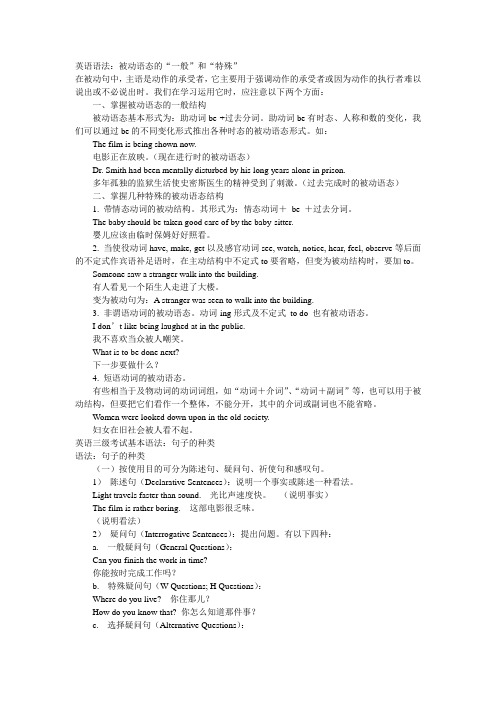
英语语法:被动语态的“一般”和“特殊”在被动句中,主语是动作的承受者,它主要用于强调动作的承受者或因为动作的执行者难以说出或不必说出时。
我们在学习运用它时,应注意以下两个方面:一、掌握被动语态的一般结构被动语态基本形式为:助动词be +过去分词。
助动词be有时态、人称和数的变化,我们可以通过be的不同变化形式推出各种时态的被动语态形式。
如:The film is being shown now.电影正在放映。
(现在进行时的被动语态)Dr. Smith had been mentally disturbed by his long years alone in prison.多年孤独的监狱生活使史密斯医生的精神受到了刺激。
(过去完成时的被动语态)二、掌握几种特殊的被动语态结构1. 带情态动词的被动结构。
其形式为:情态动词+be +过去分词。
The baby should be taken good care of by the baby-sitter.婴儿应该由临时保姆好好照看。
2. 当使役动词have, make, get以及感官动词see, watch, notice, hear, feel, observe等后面的不定式作宾语补足语时,在主动结构中不定式to要省略,但变为被动结构时,要加to。
Someone saw a stranger walk into the building.有人看见一个陌生人走进了大楼。
变为被动句为:A stranger was seen to walk into the building.3. 非谓语动词的被动语态。
动词-ing形式及不定式to do 也有被动语态。
I don’t like being laughed at in the public.我不喜欢当众被人嘲笑。
What is to be done next?下一步要做什么?4. 短语动词的被动语态。
有些相当于及物动词的动词词组,如“动词+介词”、“动词+副词”等,也可以用于被动结构,但要把它们看作一个整体,不能分开,其中的介词或副词也不能省略。
公共英语等级考试(PETS)3级常用句型汇总
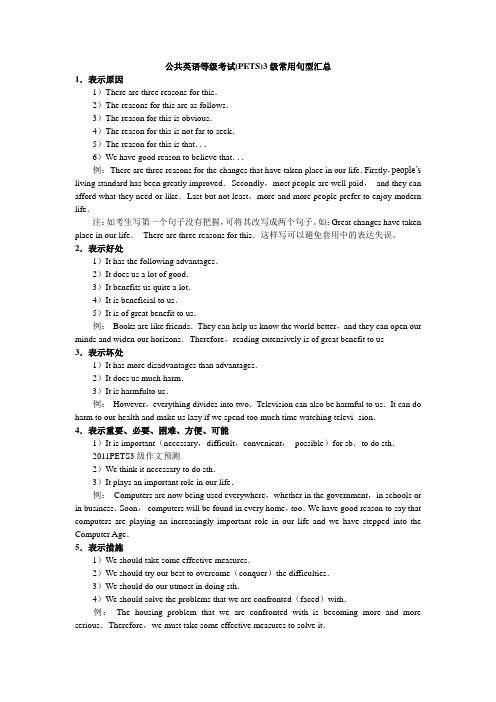
公共英语等级考试(PETS)3级常用句型汇总1.表示原因1)There are three reasons for this.2)The reasons for this are as follows.3)The reason for this is obvious.4)The reason for this is not far to seek.5)The reason for this is that...6)We have good reason to believe that...例:There are three reasons for the changes that have taken place in our life.Firstly,people’s living standard has been greatly improved.Secondly,most people are well paid,and they can afford what they need or like.Last but not least,more and more people prefer to enjoy modern life.注:如考生写第一个句子没有把握,可将其改写成两个句子。
如:Great changes have taken place in our life.There are three reasons for this.这样写可以避免套用中的表达失误。
2.表示好处1)It has the following advantages.2)It does us a lot of good.3)It benefits us quite a lot.4)It is beneficial to us.5)It is of great benefit to us.例:Books are like friends.They can help us know the world better,and they can open our minds and widen our horizons.Therefore,reading extensively is of great benefit to us3.表示坏处1)It has more disadvantages than advantages.2)It does us much harm.3)It is harmfulto us.例:However,everything divides into two.Television can also be harmful to us.It can do harm to our health and make us lazy if we spend too much time watching televi- sion.4.表示重要、必要、困难、方便、可能1)It is important(necessary,difficult,convenient,possible)for sb.to do sth.2011PETS3级作文预测2)We think it necessary to do sth.3)It plays an important role in our life.例:Computers are now being used everywhere,whether in the government,in schools or in business.Soon,computers will be found in every home,too.We have good reason to say that computers are playing an increasingly important role in our life and we have stepped into the Computer Age.5.表示措施1)We should take some effective measures.2)We should try our best to overcome(conquer)the difficulties.3)We should do our utmost in doing sth.4)We should solve the problems that we are confronted(faced)with.例:The housing problem that we are confronted with is becoming more and more serious.Therefore,we must take some effective measures to solve it.6.表示变化1)Some changes have taken place in the past five years.2)A great change will certainly be produced in the world's communications.3)The computer has brought about(导致)many changes in education.例:Some changes have taken place in people's diet in the past five years.The major reasons for these changes are not far to seek.Nowadays,more and more people are switching from grain to meat for protein,and from fruit and vegetable to milk for vitamins7.表示事实、现状1)We cannot ignore the fact that...2)No one can deny the fact that...3)There is no denying the fact that...4)This is a phenomenon that many people are interested in.5)However,that's not the case.例:We cannot ignore the fact that industrialization brings with it the problems of pollution.To solve these problems,we can start by educating the public about the hazards(危害)of pollution.The government on its part should also design stricter laws to promote a cleaner environment8.表示比较1)Compared with A,B...2)I prefer to read rather than watch TV.3)There is a striking contrast between them.例:Compared with cars,bicycles have several advantages besides being affordable.Firstly,they do not consume natural resources of petrol(石油).Secondly,they do not cause the pollution problem.Last but not least,they contribute to people's health by giving them due physical exercise.9.表示数量1)It has increased(decreased)from...to...2)The population in this city has now increased (decreased)to 800,000.3)The output of July in this factory increased by 15%compared with that of January.例:With the improvement of the living standard,the proportion(比例)of people's income spent on food has decreased while that spent on education has increased.再如:From the graph listed above,itcan be seen that student use of computers has increased from an average of less than two hours per week in 1990 to 20 hours in 2000.注:"From the graph listed above,it can be seen that"见句式12。
公共英语三级常用句型(10)
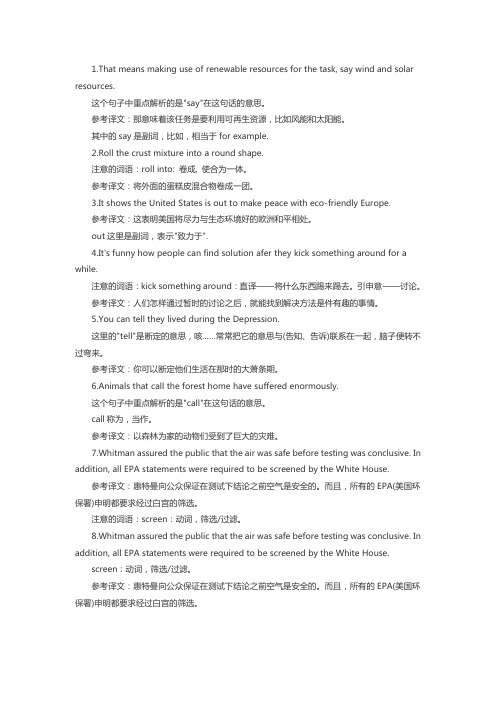
1.That means making use of renewable resources for the task, say wind and solar resources.这个句子中重点解析的是"say"在这句话的意思。
参考译文:那意味着该任务是要利用可再生资源,比如风能和太阳能。
其中的say是副词,比如,相当于for example.2.Roll the crust mixture into a round shape.注意的词语:roll into: 卷成, 使合为一体。
参考译文:将外面的蛋糕皮混合物卷成一团。
3.It shows the United States is out to make peace with eco-friendly Europe.参考译文:这表明美国将尽力与生态环境好的欧洲和平相处。
out这里是副词,表示"致力于".4.It's funny how people can find solution afer they kick something around for a while.注意的词语:kick something around:直译——将什么东西踢来踢去。
引申意——讨论。
参考译文:人们怎样通过暂时的讨论之后,就能找到解决方法是件有趣的事情。
5.You can tell they lived during the Depression.这里的"tell"是断定的意思,咳……常常把它的意思与(告知、告诉)联系在一起,脑子便转不过弯来。
参考译文:你可以断定他们生活在那时的大萧条期。
6.Animals that call the forest home have suffered enormously.这个句子中重点解析的是"call"在这句话的意思。
call称为,当作。
公共英语三级语法大总结
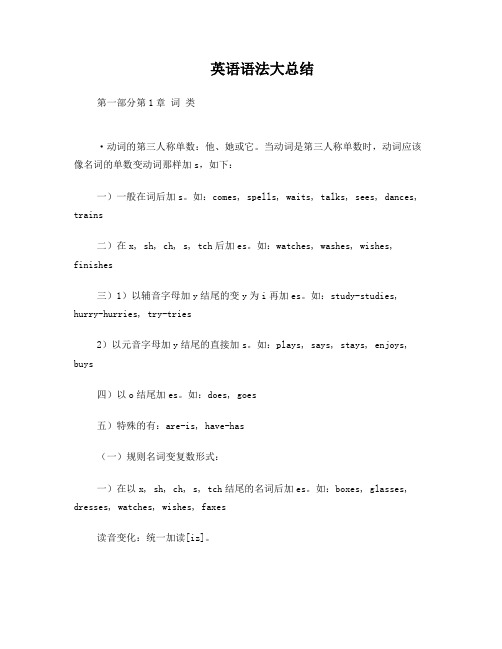
英语语法大总结第一部分第1章词类·动词的第三人称单数:他、她或它。
当动词是第三人称单数时,动词应该像名词的单数变动词那样加s,如下:一)一般在词后加s。
如:comes, spells, waits, talks, sees, dances, trains二)在x, sh, ch, s, tch后加es。
如:watches, washes, wishes, finishes三)1)以辅音字母加y结尾的变y为i再加es。
如:study-studies, hurry-hurries, try-tries2)以元音字母加y结尾的直接加s。
如:plays, says, stays, enjoys, buys四)以o结尾加es。
如:does, goes五)特殊的有:are-is, have-has(一)规则名词变复数形式:一)在以x, sh, ch, s, tch结尾的名词后加es。
如:boxes, glasses, dresses, watches, wishes, faxes读音变化:统一加读[iz]。
二)1)以辅音字母加y结尾的变y为i再加es 如:baby-babies, family-families,documentary-documentaries,2)以元音字母加y结尾的直接加s。
如:day-days, boy-boys, toy-toys, key-keys, ways读音变化:加读[z]。
三)1)有些以o结尾的外来词或缩略词的复数形式只加“s”。
如:radios, photos,2)以辅音字母加o结尾的加es:如: tomatoes西红柿, potatoes马铃薯3)以元音字母加o结尾的单词只加“s”。
( radio,cameo,)教你一招☆ 如果以O结尾的名词有生命力,则该词汇一般加-es。
hero,tomato,potato,Negro(黑人)[简记:黑人英雄吃西红柿马铃薯。
三级公共英语语法重点

• would rather+从句,是一个常用的虚拟语 气句型 Would rather+从句,谓语一般用过去 时来表示现在或将来。其意为“宁愿……, 还是…… 好些”“一个人宁愿另一个人做 某事”。引导从句的that常省略。在谈到过 去的动作时,谓语则用过去完成时。
• John wants to see me today. I would rather he came to tomorrow than today. 约 翰今天想去看我。我宁愿他明天来看我而 不是今天。(句中came不是表示过去而是表 示将来)
• No sooner …than 刚一…就 • We had no sooner sat down than we found it was time to go. • No sooner had we sat down than we found it was time to go.
• Now that : since • Now that you are grown up, you must stop this childish behavior. • So… as 像…一样 否定句 • This room is not so large as that one. • So far as 就… • So far as I know, he will be away for three we名词+but also +名词 名词+but +名词
• Not only… + 名词+but also +名词作主语的 结构中,谓语动词与but also 后的名词的数 保持一致。 • Not only his wife but also his children have arrived.
公共英语三级语法大总结
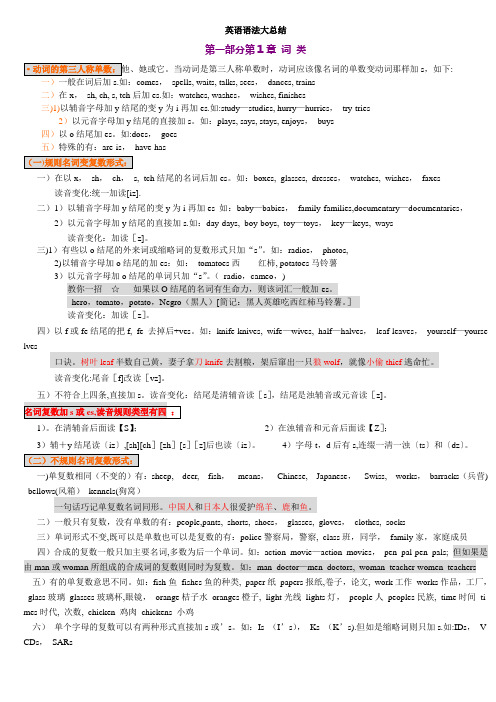
英语语法大总结第一部分第1章词类s,如下: 一)一般在词后加s.如:comes,spells, waits, talks, sees,dances, trains二)在x,sh, ch, s, tch后加es.如:watches, washes,wishes, finishes三)1)以辅音字母加y结尾的变y为i再加es.如:study—studies, hurry—hurries,try-tries2)以元音字母加y结尾的直接加s。
如:plays, says, stays, enjoys,buys四)以o结尾加es。
如:does,goes五)特殊的有:are-is,have-has一)在以x,sh,ch,s, tch结尾的名词后加es。
如:boxes, glasses, dresses,watches, wishes,faxes 读音变化:统一加读[iz].二)1)以辅音字母加y结尾的变y为i再加es 如:baby—babies,family-families,documentary—documentaries,2)以元音字母加y结尾的直接加s.如:day-days, boy-boys, toy—toys,key—keys, ways读音变化:加读[z]。
三)1)有些以o结尾的外来词或缩略词的复数形式只加“s”。
如:radios,photos,2)以辅音字母加o结尾的加es:如:tomatoes西红柿, potatoes马铃薯3)以元音字母加o结尾的单词只加“s”。
(radio,cameo,)教你一招☆如果以O结尾的名词有生命力,则该词汇一般加-es。
hero,tomato,potato,Negro(黑人)[简记:黑人英雄吃西红柿马铃薯。
]读音变化:加读[z]。
四)以f或fe结尾的把f, fe 去掉后+ves。
如:knife-knives, wife—wives, half—halves,leaf-leaves,yourself—yourse lves口诀。
公共英语三级知识点(部分)
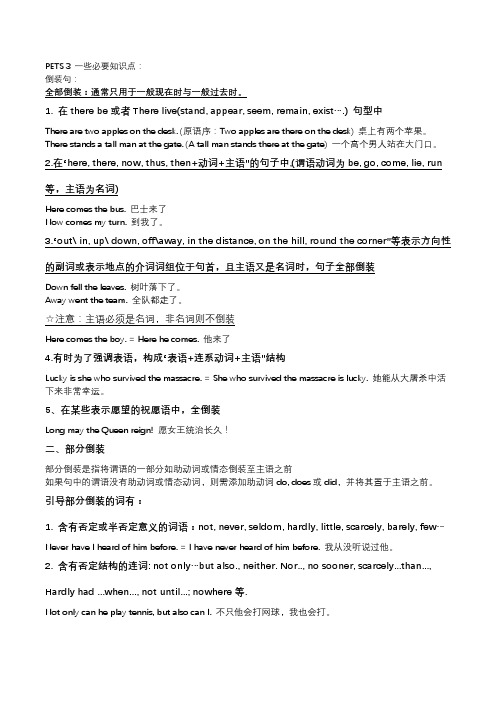
PETS 3 一些必要知识点:倒装句:全部倒装:通常只用于一般现在时与一般过去时。
1. 在there be或者There live(stand, appear, seem, remain, exist….) 句型中There are two apples on the desk. (原语序:Two apples are there on the desk) 桌上有两个苹果。
There stands a tall man at the gate. (A tall man stands there at the gate) 一个高个男人站在大门口。
2.在“here, there, now, thus, then+动词+主语”的句子中,(谓语动词为be, go, come, lie, run等,主语为名词)Here comes the bus. 巴士来了Now comes my turn. 到我了。
3.“out\ in, up\ down, off\away, in the distance, on the hill, round the corner”等表示方向性的副词或表示地点的介词词组位于句首,且主语又是名词时,句子全部倒装Down fell the leaves. 树叶落下了。
Away went the team. 全队都走了。
☆注意:主语必须是名词,非名词则不倒装Here comes the boy. = Here he comes. 他来了4.有时为了强调表语,构成“表语+连系动词+主语”结构Lucky is she who survived the massacre. = She who survived the massacre is lucky. 她能从大屠杀中活下来非常幸运。
5、在某些表示愿望的祝愿语中,全倒装Long may the Queen reign! 愿女王统治长久!二、部分倒装部分倒装是指将谓语的一部分如助动词或情态倒装至主语之前如果句中的谓语没有助动词或情态动词,则需添加助动词do, does或did,并将其置于主语之前。
公共英语三级知识点
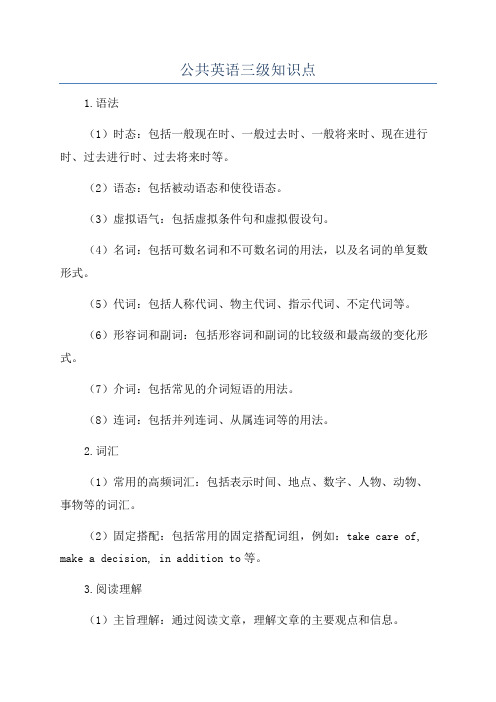
公共英语三级知识点
1.语法
(1)时态:包括一般现在时、一般过去时、一般将来时、现在进行时、过去进行时、过去将来时等。
(2)语态:包括被动语态和使役语态。
(3)虚拟语气:包括虚拟条件句和虚拟假设句。
(4)名词:包括可数名词和不可数名词的用法,以及名词的单复数形式。
(5)代词:包括人称代词、物主代词、指示代词、不定代词等。
(6)形容词和副词:包括形容词和副词的比较级和最高级的变化形式。
(7)介词:包括常见的介词短语的用法。
(8)连词:包括并列连词、从属连词等的用法。
2.词汇
(1)常用的高频词汇:包括表示时间、地点、数字、人物、动物、事物等的词汇。
(2)固定搭配:包括常用的固定搭配词组,例如:take care of, make a decision, in addition to等。
3.阅读理解
(1)主旨理解:通过阅读文章,理解文章的主要观点和信息。
(2)细节理解:通过阅读文章,寻找并理解文章中的细节信息。
(3)推理判断:通过阅读文章,运用逻辑思维推理出正确的答案。
(4)词义猜测:根据文章上下文,推测出词语的含义。
4.写作
(1)个人简介:写作自我介绍,包括姓名、年龄、职业、爱好等。
(2)描写事物:写作对人、地点、事物的描写,包括外貌特征、性格特点、场所环境等。
(3)写作推荐信:写作推荐信,包括介绍被推荐人的基本情况、能力和优势等。
大学英语三级语法详解
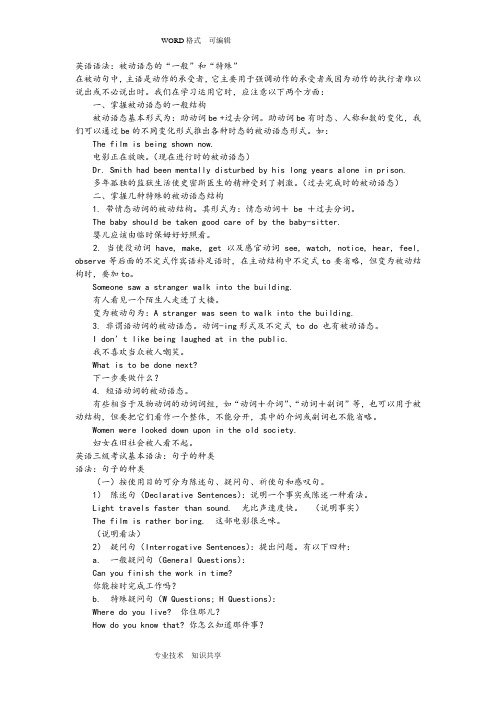
英语语法:被动语态的“一般”和“特殊”在被动句中,主语是动作的承受者,它主要用于强调动作的承受者或因为动作的执行者难以说出或不必说出时。
我们在学习运用它时,应注意以下两个方面:一、掌握被动语态的一般结构被动语态基本形式为:助动词be +过去分词。
助动词be有时态、人称和数的变化,我们可以通过be的不同变化形式推出各种时态的被动语态形式。
如:The film is being shown now.电影正在放映。
(现在进行时的被动语态)Dr. Smith had been mentally disturbed by his long years alone in prison.多年孤独的监狱生活使史密斯医生的精神受到了刺激。
(过去完成时的被动语态)二、掌握几种特殊的被动语态结构1. 带情态动词的被动结构。
其形式为:情态动词+ be +过去分词。
The baby should be taken good care of by the baby-sitter.婴儿应该由临时保姆好好照看。
2. 当使役动词have, make, get以及感官动词see, watch, notice, hear, feel, observe等后面的不定式作宾语补足语时,在主动结构中不定式to要省略,但变为被动结构时,要加to。
Someone saw a stranger walk into the building.有人看见一个陌生人走进了大楼。
变为被动句为:A stranger was seen to walk into the building.3. 非谓语动词的被动语态。
动词-ing形式及不定式 to do 也有被动语态。
I don’t like being laughed at in the public.我不喜欢当众被人嘲笑。
What is to be done next?下一步要做什么?4. 短语动词的被动语态。
- 1、下载文档前请自行甄别文档内容的完整性,平台不提供额外的编辑、内容补充、找答案等附加服务。
- 2、"仅部分预览"的文档,不可在线预览部分如存在完整性等问题,可反馈申请退款(可完整预览的文档不适用该条件!)。
- 3、如文档侵犯您的权益,请联系客服反馈,我们会尽快为您处理(人工客服工作时间:9:00-18:30)。
2019年公共英语三级考试经典语法讲解(10)
虚拟语气
虚拟语气表示与客观事实相反的假设,由if虚拟条件从句和主
句构成。
一、虚拟语气的基本内容
根据虚拟与其这种与事实相反的假设所对应的时间不同,虚拟语
气的if虚拟条件从句与主句的谓语动词分别有三类构成形式:
假设类型If虚拟条件从句
主句与现在事实相反 Did/were Would/should do 与过去事实相
反 Had done Would/should have done 与将来事实可能相反 Were to do/did/should do Would/should do
例:1、I wouldn't talk that way if I were Peter.
2、If the whole operation had not been planned before hand, a great deal of time and money
would have been lost
3、Jean doesn't want to work right away because she
thinks that if she were to get a job she probably wouldn’t
be able to see her friends very often.
4、I would ask George to lend us the money if I knew him.
5、Do you think there would be less conflict (战斗、斗争) in the world if all people spoke the same language.
6、If Bob had come with us, he would have had a good time.
二、if的省略形式(又称虚拟语气的倒装结构)
在if虚拟条件从句中,如果谓语部分包含were,should,had 等词,则能够把这些词放到主语前,省略if,构成虚拟语气的倒装结构。
三、主句与从句时间不一致时虚拟语气的构成
当虚拟语气的if虚拟条件从句和主句的动作发生的时间不一致时,要根据各自表示的时间采用对应的虚拟语气的构成形式。
例:1、If I had attended the meeting yesterday, I would know what happened now.
2、If you had taken our advice at that time, you would not be in trouble now.
四、主观倾向性动词引导的虚拟语气的构成
在英语中存有一些动词,表示建议、命令、要求等主观的倾向,由这些动词引导的that宾语从句中,从句的谓语动词要用should+动词原形,should能够省略。
这类常见的主观倾向性动词有“一坚持、二命令、三建议、五要求”,分别是:
一坚持:insist 二命令:order、command 三建议:suggest、advise(n advice)、propose(提议、建议) 五要求:ask、demand、require、request、desire
例:1、The doctor advised that Mr. Malan have an operation right away so as to save his life.
2、His mother insisted that he put on the coat when going out. 同时,如果在题干中出现上面这些主观倾向性动词的名词和形容词形式,题干中从句部分的谓语动词也要用should+动词原形,should能够省略。
考试中常见的词汇有:order,command,
suggestion,advice,proposal,demand,request,desire,advisable,desirable.
五、wish that和if only引导的虚拟语气的构成
Wish that引导的宾语从句和if only引起的感叹句都用虚拟语气来表示一种没有实现或无法实现的愿望,其中wish that句型往往翻译为:多么希望?;if only表示的愿望较wish that更强烈,常翻译为但愿;要是?就好了。
两者的用法基本相同。
两者的用法是:1、当表示与现在的事实相反的一种愿望时,wish that引导的宾语从句和if only引起的感叹句中谓语动词采用的形式是:did/were;
2、当表示与过去的事实相反的一种愿望时,wish that引导的宾语从句和if only引起的感叹句中谓语动词采用的形式是:had done;
3、当表示未来一时很难实现的一种愿望时,wish that引导的宾语从句和if only引起的感叹句中谓语动词采用的形式是:would do.
六、would rather引导的虚拟语气的构成
Would rather的意思是“宁愿、宁可”其引导的宾语从句(一般省去that)通常用虚拟语气表示一种与事实相反的假设。
我们能够假设A.B是两个人,通过牢记一下句式来记住其用法:
1、A would rather B did sth:表示与现在或将来事实相反的一种假设
2、A would rather B had done sth:表示与过去事实相反的一种假设。
